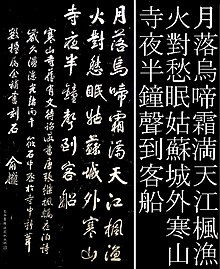Zhang Ji (poet)
Zhang Ji ( Chinese 張繼 / 张继 ; active in the 8th century, coming of age Yisun懿 孙), was a Chinese poet, born in Xiangyang during the Tang period .
Live and act
Little is known about Zhang. He lived from about 712 or 715 to 779 and is known to have passed the Jinshi Imperial Examination in 753. He made a career as Secretary of the Tax Revenue Department.
A poem

Zhang Ji was a contemporary of Li Bai and Du Fu during the heyday of Tang poetry . He is best known for his poem "Nocturnal Mooring at the Maple Bridge" ( Fengqiao yebo楓橋 夜泊), which was included in the collection of Three Hundred Tang Poems . It has come down to us as a rubbed stone in a calligraphy by Yu Yue (俞 樾, 1821–1907), which is also very popular in Japan. - Ozu Yasujirō puts them on in his film Once Upon a Father from 1942 as jewelry in a classroom, at a time when China was no longer quoted in Japan as it called itself, namely "Middle Country" (中国), but only condescendingly loudly as “Shina” (支那).
The poem is in the form of four lines of seven characters each. An approximate rendering of the content is as follows:
- 月 落 烏啼 霜 満 天: The moon is setting, crows croaking, frost all over the sky,
- 江楓 漁火 對 愁 眠: Maple trees by the river, the fishermen's fires - my sorrowful sleep.
- 姑蘇 城外 寒山寺: From the Hanshan Temple outside the walls of Gusu
- 夜半 鐘聲 到 客船: At midnight the sound of the bell penetrates the boat.
Remarks
- ↑ The Hanshan Temple takes its name from the monk Hanshan , who according to tradition worked there. Gusu is an old name from Suzhou .
Web links
| personal data | |
|---|---|
| SURNAME | Zhang Ji |
| ALTERNATIVE NAMES | 張繼 |
| BRIEF DESCRIPTION | Chinese poet of the Tang Dynasty |
| DATE OF BIRTH | 712 |
| DATE OF DEATH | 779 |